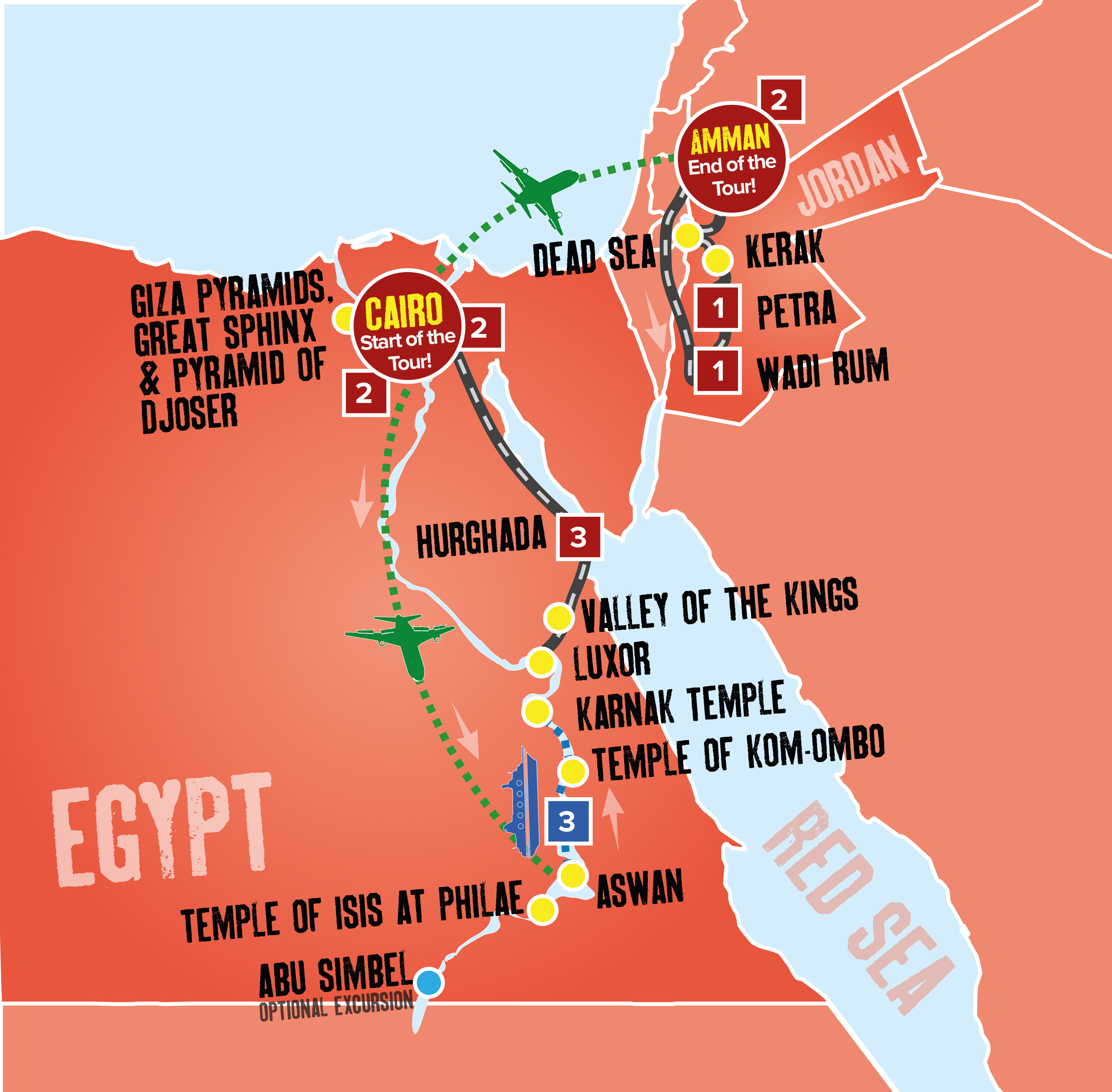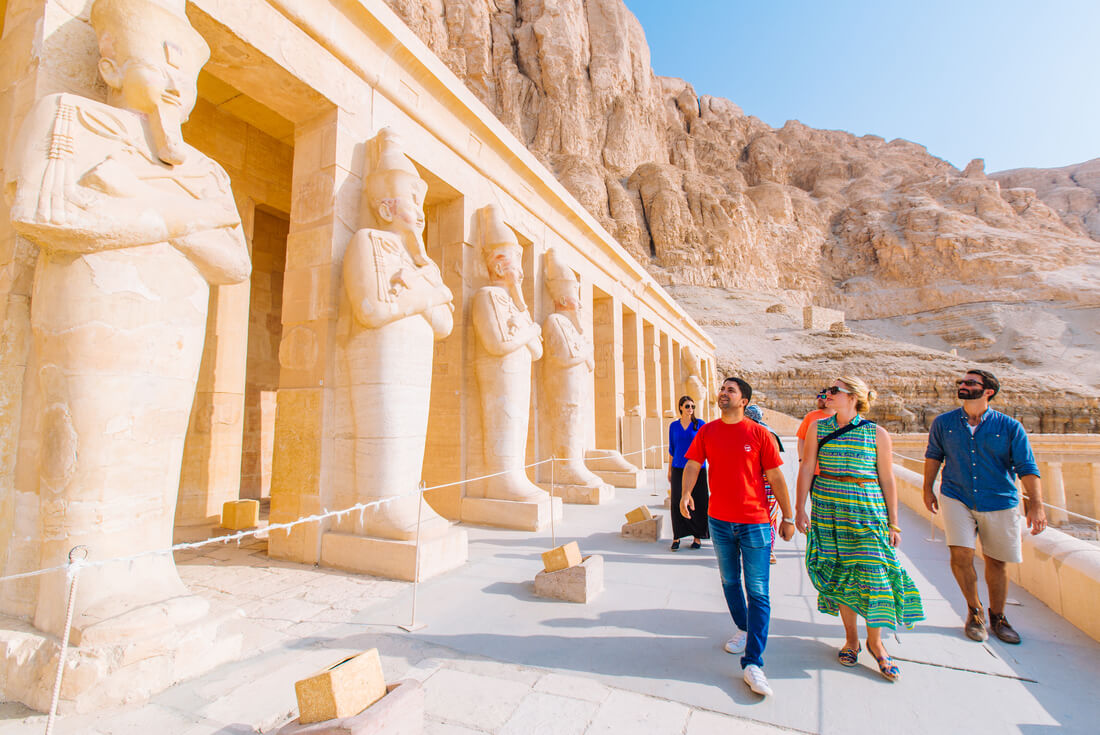Connecting Cultures: Egypt and Jordan Tour Packages Designed for Canadian Explorers

Overview of Egypt and Jordan
Geography and Location
When you think of Egypt and Jordan, envision the rich tapestry of landscapes stretching from the majestic Nile River to the enchanting deserts of Wadi Rum.
- Egypt: Located in North Africa, Egypt boasts the colossal pyramids of Giza and the ancient ruins scattered across its land. It borders the Mediterranean Sea to the north, providing breathtaking coastal views. The vast and fertile Nile Valley has long been the heart of Egyptian civilization.
- Jordan: In contrast, Jordan, located in the heart of the Middle East, embraces a more varied geography with the rugged highlands, the serene Dead Sea, and the ancient city of Petra carved from rose-red rock.
Both countries have unique geographical features that attract adventurers and history enthusiasts alike.
Historical Significance
The historical legs of Egypt and Jordan echo through time, revealing striking narratives of ancient empires and enduring cultures.
- Egypt has served as a cradle of civilization, featuring landmarks like the Pyramids and the Sphinx, testaments to its fascinating past. The ancient Egyptians mastered art, mathematics, and architecture, leaving behind monumental temples and tombs.
- Jordan, too, is steeped in history. The Nabateans carved Petra, a UNESCO World Heritage Site, and the Roman ruins of Jerash reflect its rich cultural heritage.
Both nations have been crossroads for trade and migration, enriching their cultural landscapes.
Cultural Diversity
Cultural diversity in Egypt and Jordan reflects a mosaic of traditions, languages, and lifestyles influenced by various civilizations over millennia.
- Egyptians often celebrate with festivals, music, and dance that showcase their heritage. Popular events like the Cairo International Film Festival attract global attention.
- Jordanian culture harmoniously integrates Arab traditions with local customs. You’ll find their warm hospitality evident in homestays, showcasing the rich culinary scene that blends spices and ingredients from across the region.
Collectively, the vibrant cultural depth of both Egypt and Jordan invites discovery and appreciation from visitors.
Comparison of Egyptian and Jordanian Cultures
Language and Communication
Language plays a vital role in shaping the identity of both Egypt and Jordan, providing a glimpse into their respective heritages.
- Egyptian Arabic utilizes a distinct dialect that can be quite different from Modern Standard Arabic. Egyptians often express themselves with a charming blend of humour and eloquence, making conversations lively and engaging.
- Jordanian Arabic, while still rooted in Arabic, has its own unique nuances and influences, particularly from Bedouin culture. You'll often find Jordanians using polite forms of address, which reflects their emphasis on respect and hospitality.
If you’re travelling, a few simple phrases in Arabic can go a long way in building rapport!
Customs and Traditions
Customs and traditions bring vibrancy to the social fabric of both nations, showcasing their unique identities while sharing common threads.
- Egyptians cherish their deep-rooted celebrations, such as Eids and Coptic feasts. The rich cuisine plays a significant role, with dishes like koshari and mulukhiyah filling the tables during festive gatherings.
- In Jordan, customs remain deeply tied to Bedouin heritage. The wedding celebrations, with traditional folk dances and elaborate feasts, reveal a striking cultural unity among its people.
Both countries share a warmth and openness that makes their celebrations feel like an invitation to join in.
Religious Practices
Religion forms a pillar of both Egyptian and Jordanian life, influencing their customs and societal norms.
- Egypt, with a prominent Muslim majority, also has a significant Christian community. The coexistence of these faiths is evident during communal celebrations, particularly in cosmopolitan cities like Cairo.
- Jordan shares this religious diversity. The Hashemite Kingdom is known for its moderate stance on Islam and for nurturing an environment of acceptance, allowing for rich interfaith interactions.
Ultimately, the cultural comparison between Egypt and Jordan reveals both unique identities and shared experiences, creating a compelling narrative steeped in history and tradition.

Canadian Explorers' Perspective
Interest in Egyptian Culture
For many Canadian explorers, the allure of Egyptian culture is undeniable. The echoes of ancient history resonate through iconic landmarks that spark curiosity and admiration.
- The Pyramids of Giza stand as a testament to human ingenuity, drawing countless visitors eager to unravel their mysteries.
- Discovering the Luxor Temple at sunset, bathed in golden light, can easily become a highlight for any traveller.
Many Canadians find the richness of Egyptian folklore, art, and music inspiring. Engaging with local artisans and experiencing music and dance performances can feel like stepping into a vivid tapestry of history.
Fascination with Jordanian Heritage
Similarly, Jordan's captivating heritage draws Canadian adventurers who are eager to discover its ancient wonders.
- The ancient city of Petra, with its breathtaking rock-cut architecture, is often a bucket list destination. Walking through the Siq and arriving at the Treasury is a jaw-dropping moment for many.
- Additionally, exploring the landscapes of Wadi Rum exudes a deep connection to both nature and the stories of the Bedouins.
Canadians are mesmerised by the warmth of Jordanian hospitality, making their explorations not just about sightseeing but also about forging connections.
Tourist Attractions Appeal
The blend of historical significance and natural beauty in both countries appeals to a wide range of interests.
- In Egypt, the vibrancy of the Cairo markets and the serene waters of the Nile River cruises offer diverse experiences.
- Meanwhile, Jordan’s charm extends to the Dead Sea, where visitors can float effortlessly, and the Roman ruins of Jerash beckon those keen on history.
The synergistic appeal of these attractions creates a compelling reason for Canadian travellers to navigate between the treasures of Egypt and the marvels of Jordan, each offering an unforgettable adventure.

Egypt and Jordan Tour Packages
Inclusions and Itinerary
When you decide to embark on a tour of Egypt and Jordan, you’ll find that most packages offer an exciting blend of inclusions designed to enrich your experience. Typical inclusions might feature:
- Guided Tours: Knowledgeable local guides provide insights that bring historic sites to life. Imagine standing on the banks of the Nile, accompanied by a guide who spins tales of ancient Egyptian life.
- Meals: Most packages include breakfast and often feature traditional meals, giving you a taste of local cuisine.
- Entry Fees: Visits to iconic sites like the Pyramids, Petra, and the Dead Sea are usually covered.
An itinerary may kick off with a journey through Cairo, leading to the wonders of Luxor, then crossing over to Jordan for visits to Petra and Wadi Rum.
Accommodation Options
Accommodation can make all the difference in your travel experience.
- Luxury Hotels: Options like the Four Seasons in Cairo or the Movenpick Resort in Petra offer stunning views and top-notch amenities.
- Boutique Hotels: For a more intimate experience, boutique hotels in cities like Amman provide unique decor and personal touches that reflect local culture.
- Budget Stays: Youth hostels and budget hotels allow for flexibility while still being in proximity to the action.
Regardless of your choice, you’ll find that each place offers its own charm, making your journey all the more memorable.
Transportation Details
Getting around these two fascinating countries is typically hassle-free with well-planned transportation arrangements.
- Air Travel: Flights between major cities, such as Cairo to Aqaba, save time and offer beautiful aerial views.
- Private Transfers: Most packages include private transfers, ensuring comfort and ease as you travel from one site to another. Imagine relaxing in a roomy vehicle, excitedly anticipating your next adventure!
- Local Transportation: In cities, options such as guided minivan tours or even taxis can provide flexibility for spontaneous explorations.
With carefully crafted tours, you'll be set to delve deep into the wonders of Egypt and Jordan, creating delightful memories along the way.

Cultural Experiences and Activities
Visiting Historical Sites
When travelling through Egypt and Jordan, immersing yourself in historical sites is nothing short of breathtaking.
- In Egypt, exploring the Valley of the Kings is advantageous for history buffs. As you step into the tombs of ancient pharaohs, the intricate wall carvings and rich colours transport you back thousands of years.
- Crossing over to Jordan, the monumental site of Petra is simply awe-inspiring. Walking through the Siq and seeing the Treasury emerge from the rock face evokes a sense of wonder that lingers long after your visit.
Each historical site allows you to connect with the past on a deeply personal level.
Participating in Local Traditions
Participating in local traditions offers a wonderful way to engage with the cultures of Egypt and Jordan.
- Whether it’s joining a traditional Egyptian wedding celebration or experiencing Arab hospitality through a welcoming gathering in a Jordanian home, these moments enrich your travel experience.
- In Egypt, you might experience a lively folk dance performance, while in Jordan, engaging in Dabke, a traditional line dance, can be both fun and memorable.
By participating in these local customs, you gain insights into everyday life that you won’t find in guidebooks.
Trying Authentic Cuisine
Finally, don't overlook the culinary experiences that await you in both countries.
- In Egypt, dishes like koshari (a hearty mix of rice, lentils, and pasta topped with tomato sauce) tantalise the taste buds. You may just find yourself indulging in some street food delicacies while exploring bustling markets.
- In Jordan, the famed mansaf, a dish of lamb cooked in fermented yoghurt served on rice, offers a true taste of Jordanian tradition.
Keep an eye out for local eateries or souk stalls that serve authentic meals, where the locals dine. Sharing a meal with locals not only fills your stomach but also opens doors to conversations and stories that enrich your journey. Enjoying these cultural experiences and activities will make your visit to Egypt and Jordan truly unforgettable!
Practical Tips for Canadian Travelers
Visa Requirements
As a Canadian traveller, understanding visa requirements will help ensure a smooth journey through Egypt and Jordan.
- Egypt: Canadians can obtain a visa upon arrival at the airport or apply for an e-visa beforehand. The e-Visa option is straightforward and allows for a stay of up to 30 days. It's a good idea to have your passport valid for at least six months beyond your entry date.
- Jordan: While Canadians can obtain a visa upon arrival in Jordan, it’s wise to check if you’ll be crossing at specific borders. Consider the Jordan Pass, which provides entry to many attractions and waives the visa fee if you plan on staying three nights or more.
Be sure to double-check the latest requirements before your trip to avoid surprises.
Safety Precautions
Safety is always a priority when travelling and being informed enhances your experience.
- Both Egypt and Jordan are generally safe for tourists, but staying vigilant is essential. Keep an eye on your belongings and avoid displaying valuables in crowded areas.
- Enroll in your government’s travel advisory to receive real-time updates and stay informed about safety tips.
It’s also beneficial to familiarize yourself with local laws and customs to foster respectful interactions.
Currency and Exchange Rates
Understanding the currencies of Egypt and Jordan can enhance your travel experience in more ways than one.
- Egyptian Pound (EGP) is the local currency in Egypt, while the Jordanian Dinar (JOD) is used in Jordan. Both countries have local ATM machines where you can withdraw cash, and credit cards are widely accepted in many establishments.
- Always keep some local currency handy for smaller purchases in markets or traditional restaurants. Familiarize yourself with the current exchange rates to budget effectively and avoid overspending.
To make the most of your travel, consider visiting currency exchange counters rather than relying solely on hotel services, as they often offer better rates. Taking these practical tips into account will pave the way for a memorable exploration of Egypt and Jordan, allowing you to embrace every moment with confidence.

Sustainable Tourism Practices
Eco-Friendly Initiatives
As awareness of environmental issues grows, both Egypt and Jordan are making strides toward sustainable tourism.
- Eco-lodges and green hotels are popping up, incorporating solar energy, water conservation methods, and waste reduction strategies. For instance, places like the Feynan Eco-Lodge in Jordan offer a unique experience while prioritising eco-friendly practices.
- Many local tour operators are adopting sustainable methods, such as using low-emission vehicles for tours or providing guided nature walks that educate visitors about local flora and fauna.
By choosing eco-friendly accommodations and activities, you contribute to a growing movement that values the preservation of these magnificent destinations.
Supporting Local Communities
Travelling sustainably also means benefiting the local communities, which can create a more enriching experience for you as well.
- Seek out local markets and artisanal shops to support craftsmanship and ensure your money goes directly to community members. Have you ever picked out a handmade pottery piece from a local artist? The stories behind such items add value that mass-produced souvenirs lack.
- Participating in city tours or workshops led by locals helps you learn about their culture while providing income for traditional artisans. You might find that learning to cook a traditional Egyptian dish enhanced your appreciation for the local culture even more!
Responsible Travel Tips
Being a responsible traveller can enhance your experience while minimizing your environmental impact.
- Be mindful of water and energy usage during your stay. Simple actions, like turning off lights when leaving your hotel room or taking shorter showers, make a difference.
- Respect wildlife and natural habitats by observing from a distance and avoiding littering. Always stick to marked trails during hikes to help preserve the landscape.
Additionally, consider choosing off-peak times to visit popular sites, allowing for a more peaceful experience while reducing pressure on local resources. Embracing sustainable tourism practices ensures that the remarkable beauty of Egypt and Jordan can be enjoyed for generations to come, leaving a positive impact on the places we explore.
